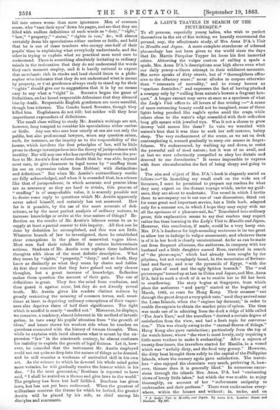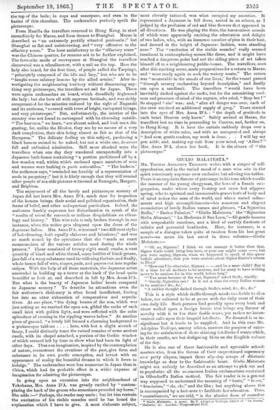A LADY'S TRAVELS IN SEARCH OF THE PICTURESQUE.*
To all persons, especially young ladies, who wish to perfect themselves in the art of fine writing, we heartily recommend the perusal, nay, the affectionate study, of Mrs. Anna D'A.'s Visit to Manilla and Japan. A more complete storehouse of ethereal phraseology has not been given to the world since the days that Dr. Martin Farquhar Tupper let loose his first immortal ethics. Abhorring the vulgar custom of calling a spade a spade, Mrs. Anna D'A.'s descriptions soar high above even what our daily penny-a-liners attempt in their subliniest moments. She never speaks of dirty streets, but of "thoroughfares offen- sive to the olfactory sense ;" never alludes to corpses otherwise than "remnants of mortality," and to roomy houses as "spacious domiciles ;" and expresses the fact of having plucked a nosegay only by "culling from nature's bowers a fragrant bou- quet." A longer extract may serve at once as a specimen of what the Lady's Visit offers to all lovers of fine writing :—" A scene of more entrancing beauty could not be imagined, some of these lights being perched like eagle's eyries amid the crags, while others close to the water's edge resembled with their reflection long gilt spears with jewelled tips. Was it not a shame to grow drowsy 'mid scenes like these? In vain we wrestled with nature's hint that it was time to seek her soft restorer, balmy sleep. The very enchantment of the scene, as we sat on deck contemplating it, seemed gradually to steep our senses in forget-. fulness. We endeavoured, by walking up and down, to resist the powerful call of tired nature ; but it was of no avail, and at last we were reluctantly compelled to obey her dictate and descend to our dormitories." It seems impossible to express with finer circumlocution the fact of being sleepy and going to bed.
The aim and object of Mrs. D'A.'s book is elegantly stated as follows :—" In launching my small craft on the wide sea of literature, I must be permitted to prepare my readers for what they may expect on the distant voyage which, under my guid- ance, they are about to undertake. The vessel in which I invite them to accompany me is not one of vast dimensions, fitted out for some great and important service, but a little bark, adapted only for a summer sea, in which I hope they may enjoy with me all the agremens of a pleasure-sail, &c." Translated into ordinary prose, this explanation seems to say that readers may expect rather fun than learning in the Lady's Visit to Manila and Japan. However, this conclusion, if made, would be a very hasty one. Mrs. D'A.'s fondness for high-sounding sentences is far too great to allow her to indulge in vulgar amusement, and whatever there is of it in her book is clearly unintentional. As far as can be Made out from frequent allusions, the authoress, in company with her husband and a little daughter named Rose, travelled in search of "the picturesque," which had already been sought by the pilgrims, but not compleyely found, in the mountains of Switzer- land and Savoy, and near the pyramids of Egypt, "with the vast plain of sand and the ugly Sphinx beneath." The "real picturesque" turned up at last in China and Japan, and Mrs. Anna D'A. laid in such a stock of it as to enable her to fill her book to overflowing. The story begins at Singapore, from which place the authoress "and party" started at the beginning of March, 1882, en route for Hong Kong. Their steamer "cut through the great deep at a vety quick rate," until they arrived near the Lema Islands, when the "engines lay dormant," in order to enable the captain to obtain the market price of opium. The time was made use of in admiring from the deck a ridge of hills called "The Ass's Ears," and the travellers "derived a certain degree of satisfaction from the view, and had a fresh topic for conversa- tion." This was clearly owing to the "eternal fitness of things." Hong' Kong also gave satisfaction ; particularly from the top of the watch-house, where "the view is most lovely, only requiring a little more verdure to make it enchanting." After a sojourn of twenty-four hours, the travellers started for Manilla, in a vessel which was "awfully dirty, and the food very greasy." However, the dirty boat brought them safely to the capital of the Philippine Islands, where the scenery again gave satisfaction. The travel- lers "also enjoyed the chocolate very much, preferring it, how- ever, thinner than it is generally liked." In numerous excur- sions through the islands Mrs. Anna. D'A. had "enchanting views of lovely little lakes," but which she was unable to enjoy thoroughly, on account of her "unfortunate antipathy to cockroaches and their perfume." There were cockroaches every- where, within the houses and without; in, under, and on
• A Lairs Visit to Monilla and Japan. By Anna HA. London: Hurst and Blaokett. Pp. 297.
the top of the beds; in cups and saucepans, and even in the basins of thin chocolate. The cockroaches perfectly spoilt the picturesque.
From Manilla the travellers returned to Hong Kong, to start immediately for Macao, and from thence to Shanghai. Macao is described as "an extremely prettily situated peninsula ;" but Shanghai as flat and uninteresting, and "very offensive to the olfactory sense." The least satisfactory to the "olfactory sense" was the Chinese quarter, for reasons not to be further explained. The favourite mode of conveyance at Shanghai the travellers discovered was a wheelbarrow, with a sail on the top. Here the lady also heard, for the first time, of people called the Taepings, " principtilly composed of the idle and lazy," but who are to be " taught some salutary lessons by the allied armies." After in- vestigating the neighbouring territory without discovering any- thing very picturesque, the travellers set sail for Japan. There were again cockroaches on board, which dreadfully frightened the lady ; but she bore all with supreme fortitude, and was richly compensated for the miseries endured by the sight of Nagasaki and its environs," covered with trees of bright, variegated foliage, and very picturesque." But, unfortunately, the interior of the country was not found to correspond with its charming outside. "The boatmen," we learn," are almost naked, and look most dis- gusting, for, unlike the Hindoo, they are by no means of a very dark complexion, their skin being almost as fair as that of the European." The delicate feeling on this subject, pardoning a black human animal to be naked, but not a white one, deicrves full and unlimited admiration. Still more shocked were the travellers when one day they wandered unexpectedly into a Japanese bath-house containing "a portion partitioned off by a low wooden wall, within which enclosed space numbers of men and women were bathing in purls naturalibus." "The bathers," the authoress says, "reminded me forcibly of a representation of souls in purgatory ;" but it is likely enough that they will remind other people of sea-side pictures witnessed at Ramsgate, Margate.
and Brighton. •
The enjoyment of all the lovely and picturesque scenery of Japan did not leave Mrs. Anna D'A. much time for inspection of the human beings, their social and political organization, their forms of belief; and other unimportant particulars. Indeed, the authoress frankly expresses her disinclination to speak of the "results of scient'fie research or tedious disquisitions on ethno- logy and history." This wise rule is only broken through in one instance, when the writer gets eloquent upon the dress of the Japanese ladies. Mrs. Anna D'A. witnessed" two different styles of hair-dressing, both equally elaborate and laborious;" and was so much struck by the operations that she "made an exact memorandum of the various articles used during the whole process." These consisted of twenty-eight small combs, a vast quantity of black and white thread, many bottles of black grease, jars full of a waxy substance used for stiffening the hair, and finally, whole boxes full of wire, shapes, pads, and papers cut into regular stripes. With the help of all these materials, the Japanese artist succeeded in building up n tower at the back of the head quite beautiful to leek at, and described in full by Mrs. Anna D'A. But what is the beauty of Japanese ladies' heads compared to Japanese scenery ? To describe its attractions even the fair authoress's dictionary is often found insufficient, forcing her into an utter exhaustion of comparatives and superla- tives. At one place, "the dying beams of the sun, which was just setting as we reached the open sea, gilded the rocks of each small islet with golden light, and were reflected with the calm splendour of evening in the rippling waves below." At another piece of ground, "a lovely bill formed a charming background to a picturesque tableau . . . . here, with but a slight stretch of fancy, I could distinctly trace the ruined remains of some ancient castle, with its chapel attached, a portion of the Gothic window of which seemed left by time to show what had been its light of
other days. Thus can imagination, inspired by the contemplation of nature, reconstruct the creations of the past, give form and substance to its own poetic conception, and invest with an appearance of reality the beautiful dreams in which it loves to indulge." The cockroaches were less numerous in Japan than in China, which had its probable effect in a wider expanse of imagination for admiring the picturesque.
In going upon an excursion into the neighbourhood of Yokohama, Mrs. Anna D'A. was greatly excited by "contem- plating the back of the groom who sometimes preceded my horse." She adds :—" Perhaps, the reader may smile ; but let him restrain the excitation of his risible muscles until he has heard the explanation which I have to give. A most elaborate subject, most cleverly tattoo3d, was what occupied my attention. It represented a Japanese in full dress, seated in an arbour, as I judged by the profusion of red and blue flowers that appeared in all directions. He was playing the flute, the harmonious sounds of which were apparently exciting the admiration and delight of two ladies, who, with an immense number of pins in their hair, and dressed in the height of Japanese fashion, were standing near." The "excitation of the risible muscles" really seemed imminent in contemplating scenes like these, and it might have reached a dangerous point had not the riding piece of art taken himself off to a neighbouring public-house. The travellers, soon after this exciting scene, made preparations for a return to Macao, and "were ready again to seek the watery waste." The return was "memorable in the annals of our lives," for the vessel passed "through scenery enchanting beyond description," and finally ran upon a sandbank. The travellers " would have been inevitably dashed against the rocks, but for the astonishing cool- ness and presence of mind of the captain, who cried, "Stop her I" So stopped "she" was; and, "after all danger was over, each of the crew received an additional supply of grog." Tears started into the eyes of Mrs. Anna D'A.: "the depth of gratitude in each heart Heaven only knew:' Safely arrived at Macao, the travellers lost no time in proceeding to Canton, and, further on, to Hong Kong. It is here the curtain suddenly drops over a description of white mice, and with an unexpected and abrupt "And now, gentle readers, my work is done. . . I will lay my pen aside, and, making my exit from your mind, say 'Adieu " Mrs. Anna D'A. closes her book. It is the climax of "the picturesque."































 Previous page
Previous page